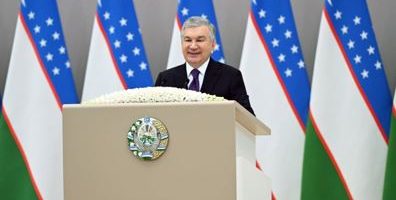Azerbaijani president receives UN General Assembly head

BAKU, APR 10 – Volkan Bozkır, the Turkish diplomat currently heading the UN General Assembly, met Azerbaijani President Ilham Aliyev in the capital of Baku on Friday, according to the Presidency of Azerbaijan.
Aliyev stressed the injustice experienced in sharing coronavirus vaccines around the world and noted that vaccine nationalism is on the world’s agenda.
“Azerbaijan was one of the first countries to raise this problem. Today we are working to eliminate this injustice,” he said.
He touched on the situation in Karabakh and indicated that historical, religious and cultural monuments of Azerbaijan were destroyed by Armenians during the occupation period.
He urged international organizations, especially UNESCO, to come to the region and see the destruction.
“Armenian brutality and Vandalism are obvious in the liberated lands,” he said noting that more observation of international organizations means more information in the world public opinion about the conflict and what Armenia did during the occupation.
Bozkır said he was proud to visit Azerbaijan as the Chairman of the UN General Assembly and praised Baku’s attempts to combat the pandemic and the success of the Non-Aligned Movement during the term presidency.
He also noted that all issues Aliyev mentioned are being carefully followed from New York.
During a six week-conflict, which ended with a Russian-brokered truce last November, Azerbaijan liberated several strategic cities and nearly 300 settlements and villages from nearly three decades of Armenian occupation.
Relations between Armenia and Azerbaijan — two former Soviet republics — have been tense since 1991 when the Armenian military occupied Nagorno-Karabakh, also known as Upper Karabakh, a territory internationally recognized as part of Azerbaijan, and seven adjacent regions.
A joint Turkish-Russian center was established to monitor the truce. Russian peacekeeping troops have also been deployed in the region.
Related News

2026 to become fundamental in developing all spheres: President Shavkat Mirziyoyev
TASHKENT, DEC 26 /DNA/ – President Shavkat Mirziyoyev of Uzbekistan delivered his annual State of theRead More

Urbanisation – The Azerbaijan Model
By Ansar Mahmood Bhatti President of Azerbaijan Ilham Aliyev has signed an order declaring 2026Read More


Comments are Closed